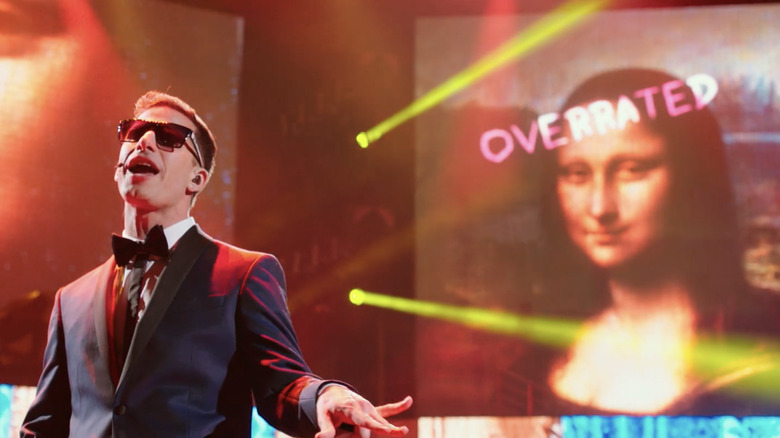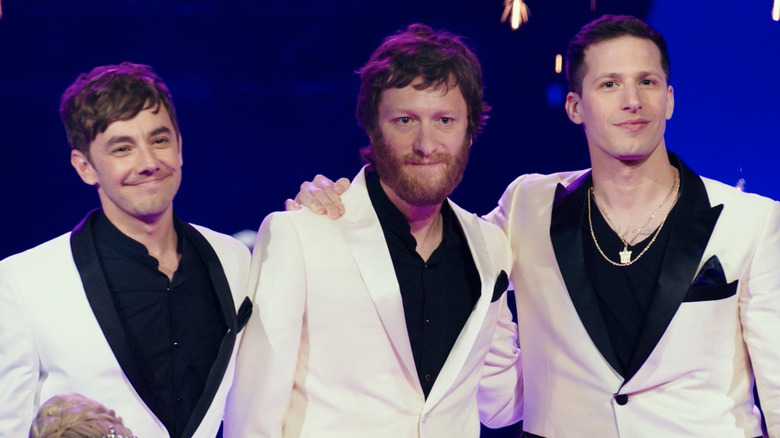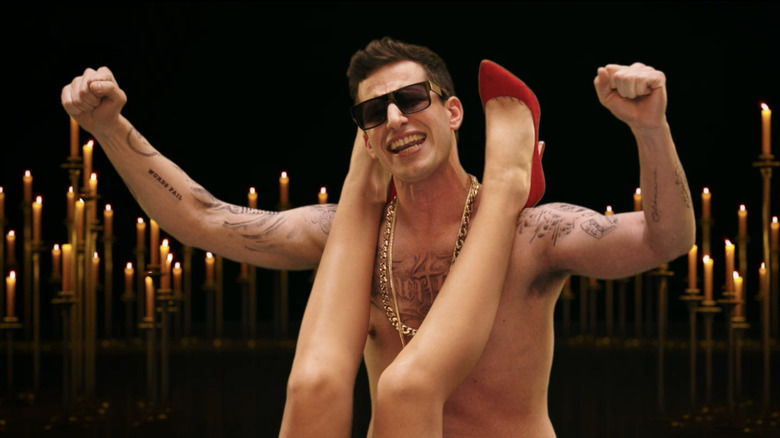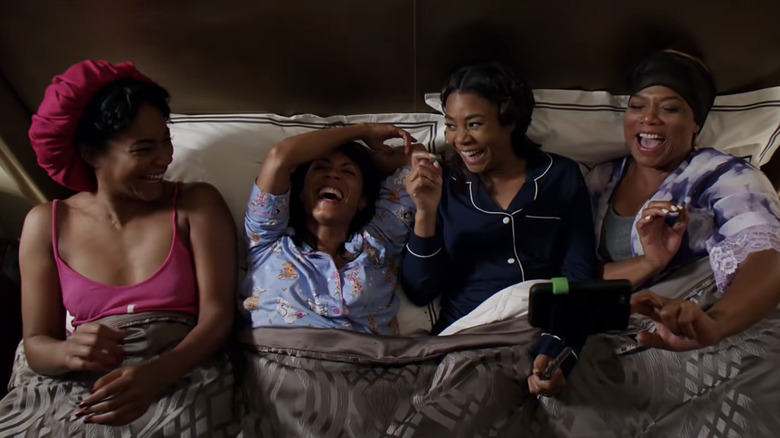The Lonely Island Think They Know Why Popstar Bombed At The Box Office
"Popstar: Never Stop Never Stopping" is one of the most underrated comedies of the last 20 years. I am not the first person to say this, and I will not be the last. Almost every person I know who has seen the film absolutely adores it. The music mockumentary created by The Lonely Island (Jorma Taccone, Andy Samberg, and Akiva Schaffer) is a packed 87 minutes of wall-to-wall hilarious absurdity. Rarely have I found myself laughing as hard I was in the theater watching this for the first time.
Actually, "underrated" might not be the right word to describe it, as its reception is mostly positive. "Underseen" is probably the more accurate phrase. We often conflate the two, but they mean different things. In the case of "Popstar: Never Stop Never Stopping," the reason its cultural reputation is not as sterling as it should be is simply because not enough people have seen it. During its theatrical run, the film could not even crack $10 million at the worldwide box office. For a major studio comedy, that is terrible.
When a movie tanks at the box office, everyone loves to turn into a detective to try and figure out why it did not connect. In this case, The Lonely Island are a very popular musical comedy act that have garnered hundreds of millions of views online for the music videos for songs like "I Just Had Sex" and "Jack Sparrow." Why did this not translate to the big screen? We all have our theories. I certainly have mine, which I'll get to later, but The Lonely Island themselves also have a guess as to why so few people showed up.
Too Justin Bieber focused
A common scapegoat for a poor box office performance is the marketing: The trailers and posters did not do enough to stir up excitement for the movie. Marketing can be poor in a couple of different ways. More often than not, a "bad trailer" means it is poorly cut and sands off the film's true personality into something meant to appeal to the widest possible audience.
Other times, though, bad marketing could come from simply emphasizing the wrong elements of the film to make the movie seem like something it isn't. This is at the heart of The Lonely Island's theory about their movie's underperformance. They think the marketing team at Universal tried to make "Popstar: Never Stop Never Stopping" into a pure Justin Bieber parody, particularly of the documentary "Justin Bieber: Never Say Never," even changing the original title to fit that. Andy Samberg said to Collider:
"The studio was very supportive. I'm not trying to talk bad [about them]. But the marketing department really wanted to lean into the Bieber aspect of it, and we did not at any point feel like what we were making was a Bieber movie."
If you see "Popstar," the movie's central character barely resembles Bieber in any way. What the film actually tries to be is a more absurd, hip-hop centric "This Is Spinal Tap." Samberg's character of Conner4Real is not a Bieber stand-in, and they never intended for him to be one. Samberg goes on to say:
"It was not necessarily our preference for [the marketing] to be so Bieber-driven and we really had no specific bone to pick with Bieber. We were really more interested in making something that was commenting on the pop machine and the music machine in general, and making crazy set pieces within that."
Misjudging expectations
Universal attempted to make "Popstar" look like a Justin Bieber parody, but they had completely misjudged something. "Never Say Never" came out five years earlier. The first wave of Bieber obsession was over, and he had just become another face in the pop scene. People saw a Bieber parody in a trailer in 2016, and it felt like old hat. I understand why The Lonely Island sees that as a reason the film did not connect as much as they hoped.
In Universal's heads, turning it to Bieber was going to make this film a gigantic deal, and if you hear that enough, you start to believe it. The studio-based expectations inflate your head, which is what happened. Andy Samberg, again to Collider, admitted as much:
"[W]hen we first started talking about making it we were like, 'It's a mockumentary, it's not going to be like that kind of a big movie,' and then, as is often the case, as you make it and you get big people involved and it's a studio and all these things start coming in to focus more, you start convincing yourself along the way that maybe you could, and then it comes out and ends up doing about what you thought it was going to do when you first start thinking about it."
If "Popstar: Never Stop Never Stopping" had kept its original title of "Conner4Real" and accurate marketing, it may have made more money, but I doubt it would have been much more. It is an inherently niche premise, and at a time when comedy is really struggling theatrically, you can only earn so much. Being content with a great film should be enough, and they made one.
The death of theatrical comedies
Do you know what the last comedy was to cross $100 million at the domestic box office? And when I say "comedy," I mean a pure comedy. Not an action comedy, a superhero comedy, an animated family comedy. I am talking about a pure, original, joke-based, live-action comedy. That would be 2017's "Girls Trip," which made $115 million domestically. That was five years ago.
In the constant chatter about whether or not people are showing up to movie theaters or not, the one genre they consistently are not showing up for is comedy. Laughter is not absent from cinemas; every genre is using it. However, people are not filling seats for plain comedies. Comedy used to be a cinematic mainstay, and comedy stars like Eddie Murphy and Jim Carrey were nearly guaranteed at least $100 million grossers just because their face was on the poster. One of the great joys of going to a theater is bursting into riotous laughter with a big group of people, but it seems nobody wants to experience that anymore.
When people go to the movies now, they need it to feel important. They need the grandest spectacle, the biggest pay-offs, and be about pre-existing characters. Going to a theater to hear some jokes? They can do that at home and watch it in between episodes of "The Office." We often chide awards bodies for not respecting comedy, but audiences aren't respecting it either. For those of us who want to laugh in a theater, we also have to deal with the adventure plot of "The Lost City" or the superhero beats of "Deadpool" to do so. While The Lonely Island may think a Justin Bieber-focused marketing campaign was their issue, I see the film's financial failure as just another indicator of the death of theatrical comedy, and I could not be more saddened about it.



